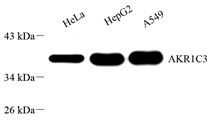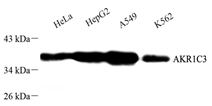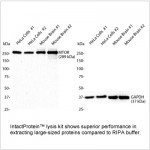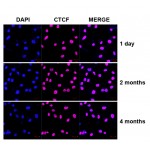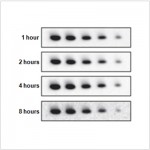Anti-AKR1C3 Rabbit pAb (100 μl)
| Reactivity: | H |
| Applications: | WB |
| Host Species: | Rabbit |
| Clonality: | Polyclonal |
| Full Name: | AKR1C3 rabbit polyclonal |
Gene Name: | Aldo-keto reductase family 1 member C3 |
Synonyms: | 17 beta HSD 5, 3 alpha HSD type 2, 3 alpha HSD type II, brain, AKR1C3, DD 3, DD3, DDX, Dihydrodiol dehydrogenase 3, HA1753, HAKRB, HAKRe, hluPGFS, HSD17B5, Indanol dehydrogenase, KIAA0119, PGFS, Prostaglandin F synthase |
Immunogen: | KLH conjugated Synthetic peptide corresponding to Human AKR1C3 |
Isotype: | IgG |
Purity: | Affinity purification |
Predicted MW. | 37 kDa |
Observed MW. | 37 kDa |
Uniprot ID: |
Product Usage Information
Applications | Species | Dilution | Positive tissue |
WB | Human | 1: 1000-1: 2000 | HeLa, HepG2, A549, K562 |
Background
AKR1C3(Aldo-keto reductase family 1 member C3) is also named as DDH1, HSD17B5, KIAA0119, PGFS and belongs to AKR1C family. .In humans, at least four AKR1C isoforms exist: AKR1C1, AKR1C2, AKR1C3, AKR1C4 and AKR1C3 shares >86% sequence identity with these three highly related human AKRs. It catalyzes the conversion of aldehydes and ketones to alcohols and androgen, estrogen, PG, xenobiotics metabolism. The rat kidney possesses a dimeric form of 75 kDa.
Images
| Western blot analysis of AKR1C3 (GB113072) at dilution of 1: 2000 Lane 1: HeLa cell lysate Lane 2: HepG2 cell lysate Lane 3: A549 cell lysate |
| Western blot analysis of AKR1C3 (GB113072) at dilution of 1: 2000 Lane 1: HeLa cell lysate Lane 2: HepG2 cell lysate Lane 3: A549 cell lysate Lane 4: K562 cell lysate |
Storage
| Storage | Store at -20°C for one year. Avoid repeated freeze/thaw cycles. |
| Storage Buffer | PBS with 0.02%sodium azide,100 μg/ml BSA and 50% glycerol. |

